Nursing Assignment: Exploring Compassion, Competence, and Conscience
VerifiedAdded on 2023/01/17
|5
|1113
|79
Essay
AI Summary
This nursing assignment explores the application of the 3Cs of care: compassion, competence, and conscience, in nursing practice. The author discusses how these principles, derived from the 6Cs of care, are essential for delivering effective, patient-centered care. The assignment emphasizes the importance of empathy, respect, and dignity in nurse-patient relationships, highlighting the NMBA code of conduct's role in guiding professional behavior. The assignment also covers competence, focusing on nurses' ability to meet patients' individualized needs, including cultural considerations, and the role of evidence-based practice. Furthermore, the assignment stresses the importance of conscience, advocating for patients, and shared decision-making with patients and their families. The author concludes by integrating these 3Cs into their personal nursing philosophy to ensure positive patient outcomes.
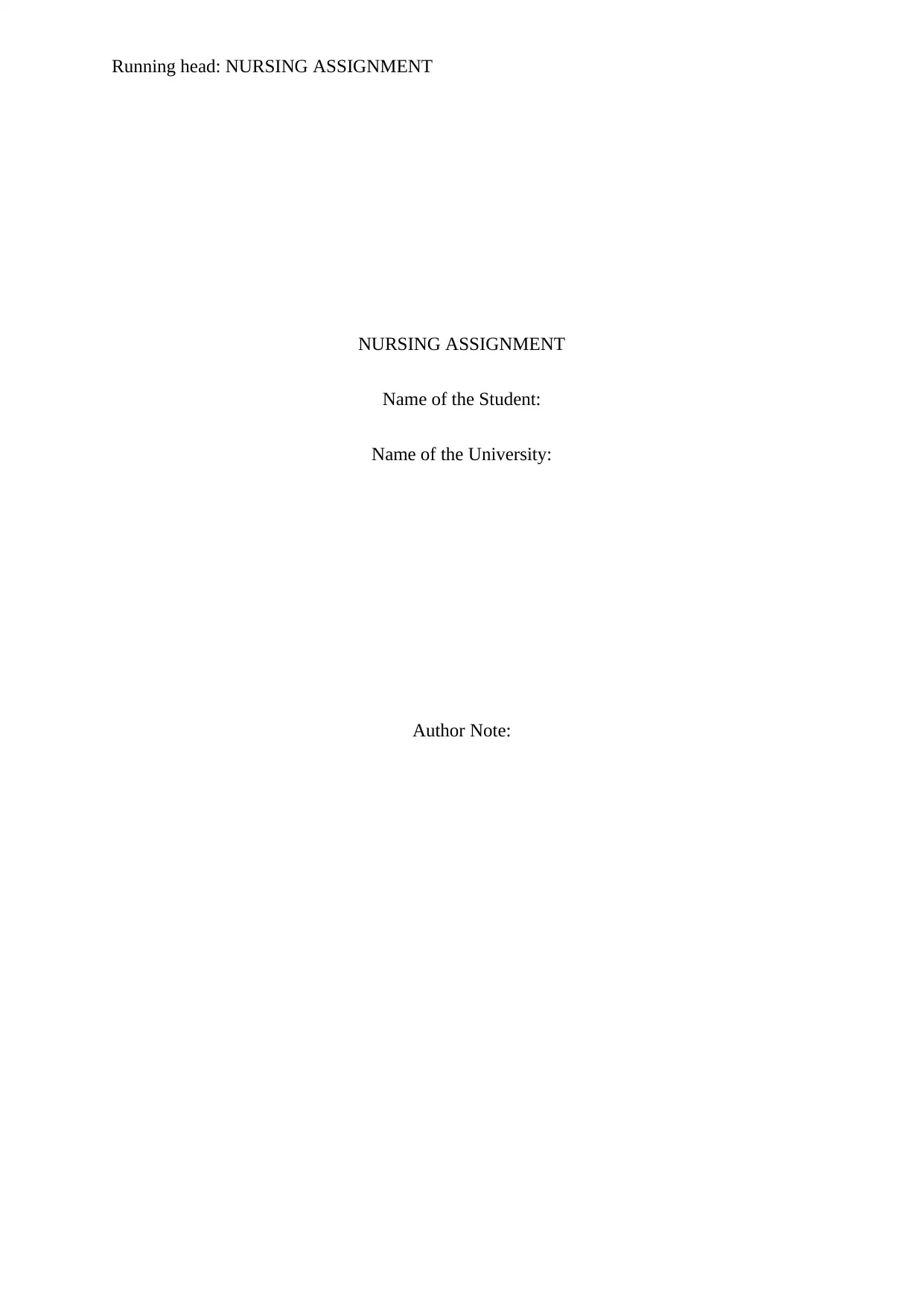
Running head: NURSING ASSIGNMENT
NURSING ASSIGNMENT
Name of the Student:
Name of the University:
Author Note:
NURSING ASSIGNMENT
Name of the Student:
Name of the University:
Author Note:
Paraphrase This Document
Need a fresh take? Get an instant paraphrase of this document with our AI Paraphraser
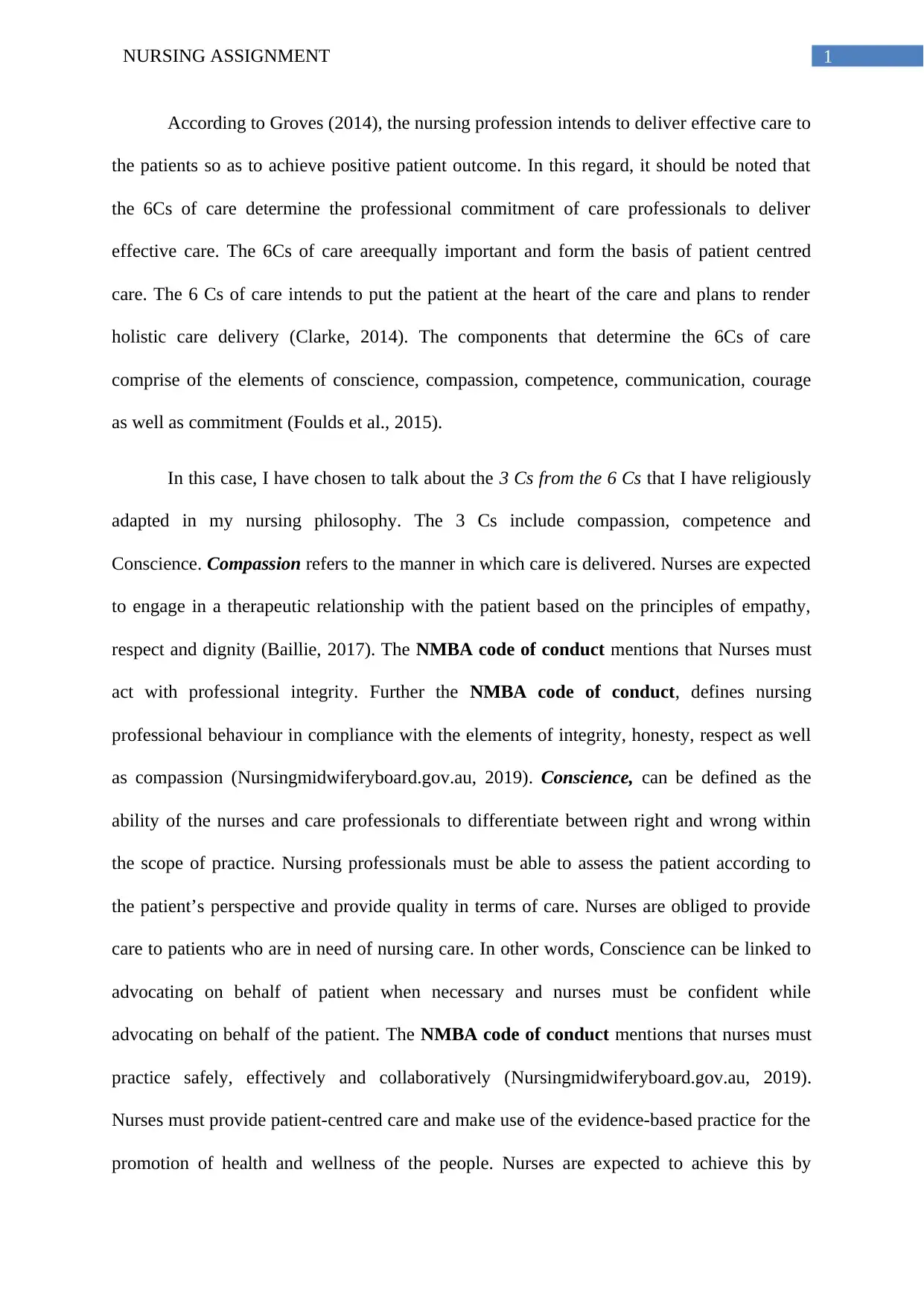
1NURSING ASSIGNMENT
According to Groves (2014), the nursing profession intends to deliver effective care to
the patients so as to achieve positive patient outcome. In this regard, it should be noted that
the 6Cs of care determine the professional commitment of care professionals to deliver
effective care. The 6Cs of care areequally important and form the basis of patient centred
care. The 6 Cs of care intends to put the patient at the heart of the care and plans to render
holistic care delivery (Clarke, 2014). The components that determine the 6Cs of care
comprise of the elements of conscience, compassion, competence, communication, courage
as well as commitment (Foulds et al., 2015).
In this case, I have chosen to talk about the 3 Cs from the 6 Cs that I have religiously
adapted in my nursing philosophy. The 3 Cs include compassion, competence and
Conscience. Compassion refers to the manner in which care is delivered. Nurses are expected
to engage in a therapeutic relationship with the patient based on the principles of empathy,
respect and dignity (Baillie, 2017). The NMBA code of conduct mentions that Nurses must
act with professional integrity. Further the NMBA code of conduct, defines nursing
professional behaviour in compliance with the elements of integrity, honesty, respect as well
as compassion (Nursingmidwiferyboard.gov.au, 2019). Conscience, can be defined as the
ability of the nurses and care professionals to differentiate between right and wrong within
the scope of practice. Nursing professionals must be able to assess the patient according to
the patient’s perspective and provide quality in terms of care. Nurses are obliged to provide
care to patients who are in need of nursing care. In other words, Conscience can be linked to
advocating on behalf of patient when necessary and nurses must be confident while
advocating on behalf of the patient. The NMBA code of conduct mentions that nurses must
practice safely, effectively and collaboratively (Nursingmidwiferyboard.gov.au, 2019).
Nurses must provide patient-centred care and make use of the evidence-based practice for the
promotion of health and wellness of the people. Nurses are expected to achieve this by
According to Groves (2014), the nursing profession intends to deliver effective care to
the patients so as to achieve positive patient outcome. In this regard, it should be noted that
the 6Cs of care determine the professional commitment of care professionals to deliver
effective care. The 6Cs of care areequally important and form the basis of patient centred
care. The 6 Cs of care intends to put the patient at the heart of the care and plans to render
holistic care delivery (Clarke, 2014). The components that determine the 6Cs of care
comprise of the elements of conscience, compassion, competence, communication, courage
as well as commitment (Foulds et al., 2015).
In this case, I have chosen to talk about the 3 Cs from the 6 Cs that I have religiously
adapted in my nursing philosophy. The 3 Cs include compassion, competence and
Conscience. Compassion refers to the manner in which care is delivered. Nurses are expected
to engage in a therapeutic relationship with the patient based on the principles of empathy,
respect and dignity (Baillie, 2017). The NMBA code of conduct mentions that Nurses must
act with professional integrity. Further the NMBA code of conduct, defines nursing
professional behaviour in compliance with the elements of integrity, honesty, respect as well
as compassion (Nursingmidwiferyboard.gov.au, 2019). Conscience, can be defined as the
ability of the nurses and care professionals to differentiate between right and wrong within
the scope of practice. Nursing professionals must be able to assess the patient according to
the patient’s perspective and provide quality in terms of care. Nurses are obliged to provide
care to patients who are in need of nursing care. In other words, Conscience can be linked to
advocating on behalf of patient when necessary and nurses must be confident while
advocating on behalf of the patient. The NMBA code of conduct mentions that nurses must
practice safely, effectively and collaboratively (Nursingmidwiferyboard.gov.au, 2019).
Nurses must provide patient-centred care and make use of the evidence-based practice for the
promotion of health and wellness of the people. Nurses are expected to achieve this by
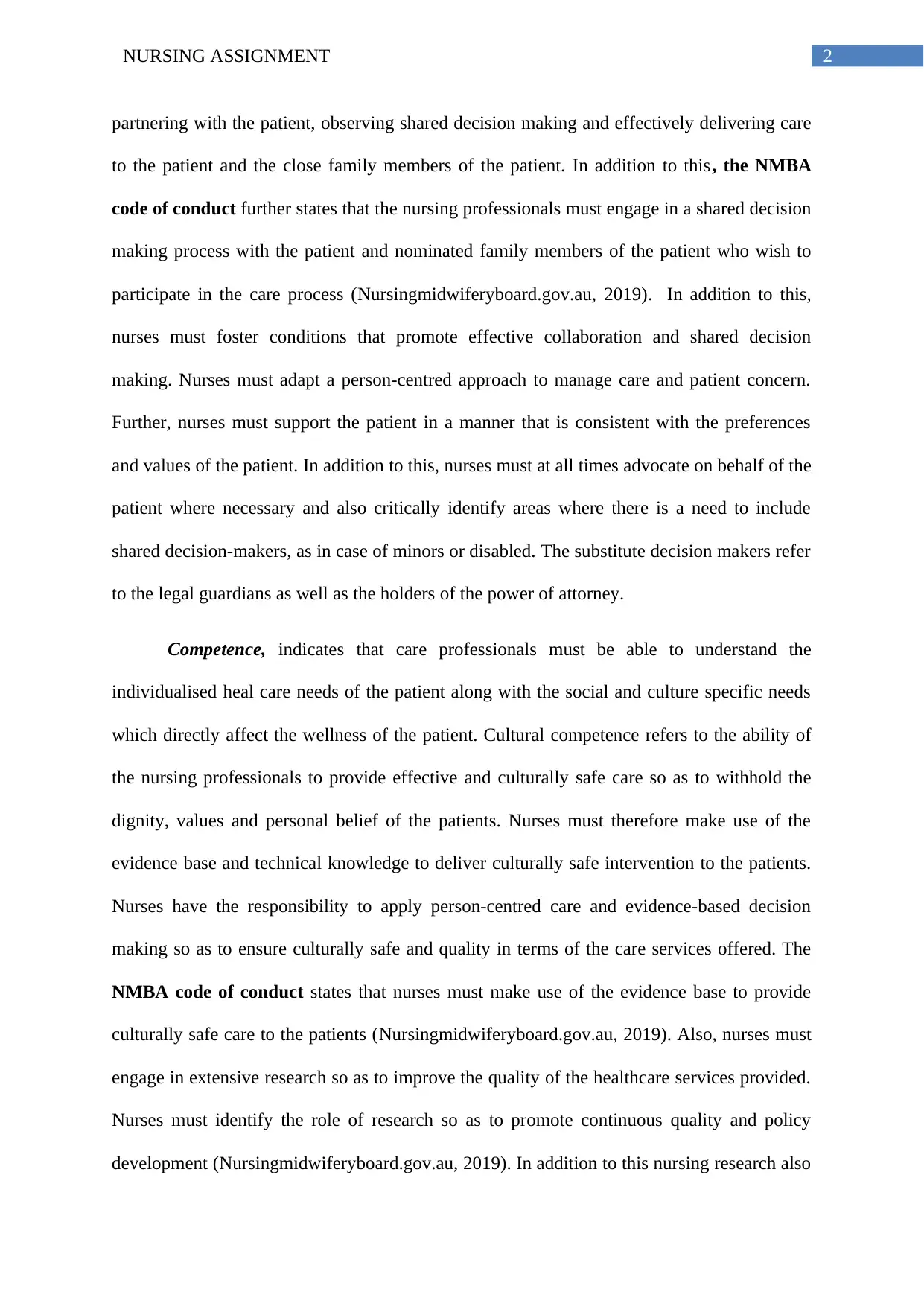
2NURSING ASSIGNMENT
partnering with the patient, observing shared decision making and effectively delivering care
to the patient and the close family members of the patient. In addition to this, the NMBA
code of conduct further states that the nursing professionals must engage in a shared decision
making process with the patient and nominated family members of the patient who wish to
participate in the care process (Nursingmidwiferyboard.gov.au, 2019). In addition to this,
nurses must foster conditions that promote effective collaboration and shared decision
making. Nurses must adapt a person-centred approach to manage care and patient concern.
Further, nurses must support the patient in a manner that is consistent with the preferences
and values of the patient. In addition to this, nurses must at all times advocate on behalf of the
patient where necessary and also critically identify areas where there is a need to include
shared decision-makers, as in case of minors or disabled. The substitute decision makers refer
to the legal guardians as well as the holders of the power of attorney.
Competence, indicates that care professionals must be able to understand the
individualised heal care needs of the patient along with the social and culture specific needs
which directly affect the wellness of the patient. Cultural competence refers to the ability of
the nursing professionals to provide effective and culturally safe care so as to withhold the
dignity, values and personal belief of the patients. Nurses must therefore make use of the
evidence base and technical knowledge to deliver culturally safe intervention to the patients.
Nurses have the responsibility to apply person-centred care and evidence-based decision
making so as to ensure culturally safe and quality in terms of the care services offered. The
NMBA code of conduct states that nurses must make use of the evidence base to provide
culturally safe care to the patients (Nursingmidwiferyboard.gov.au, 2019). Also, nurses must
engage in extensive research so as to improve the quality of the healthcare services provided.
Nurses must identify the role of research so as to promote continuous quality and policy
development (Nursingmidwiferyboard.gov.au, 2019). In addition to this nursing research also
partnering with the patient, observing shared decision making and effectively delivering care
to the patient and the close family members of the patient. In addition to this, the NMBA
code of conduct further states that the nursing professionals must engage in a shared decision
making process with the patient and nominated family members of the patient who wish to
participate in the care process (Nursingmidwiferyboard.gov.au, 2019). In addition to this,
nurses must foster conditions that promote effective collaboration and shared decision
making. Nurses must adapt a person-centred approach to manage care and patient concern.
Further, nurses must support the patient in a manner that is consistent with the preferences
and values of the patient. In addition to this, nurses must at all times advocate on behalf of the
patient where necessary and also critically identify areas where there is a need to include
shared decision-makers, as in case of minors or disabled. The substitute decision makers refer
to the legal guardians as well as the holders of the power of attorney.
Competence, indicates that care professionals must be able to understand the
individualised heal care needs of the patient along with the social and culture specific needs
which directly affect the wellness of the patient. Cultural competence refers to the ability of
the nursing professionals to provide effective and culturally safe care so as to withhold the
dignity, values and personal belief of the patients. Nurses must therefore make use of the
evidence base and technical knowledge to deliver culturally safe intervention to the patients.
Nurses have the responsibility to apply person-centred care and evidence-based decision
making so as to ensure culturally safe and quality in terms of the care services offered. The
NMBA code of conduct states that nurses must make use of the evidence base to provide
culturally safe care to the patients (Nursingmidwiferyboard.gov.au, 2019). Also, nurses must
engage in extensive research so as to improve the quality of the healthcare services provided.
Nurses must identify the role of research so as to promote continuous quality and policy
development (Nursingmidwiferyboard.gov.au, 2019). In addition to this nursing research also
⊘ This is a preview!⊘
Do you want full access?
Subscribe today to unlock all pages.

Trusted by 1+ million students worldwide
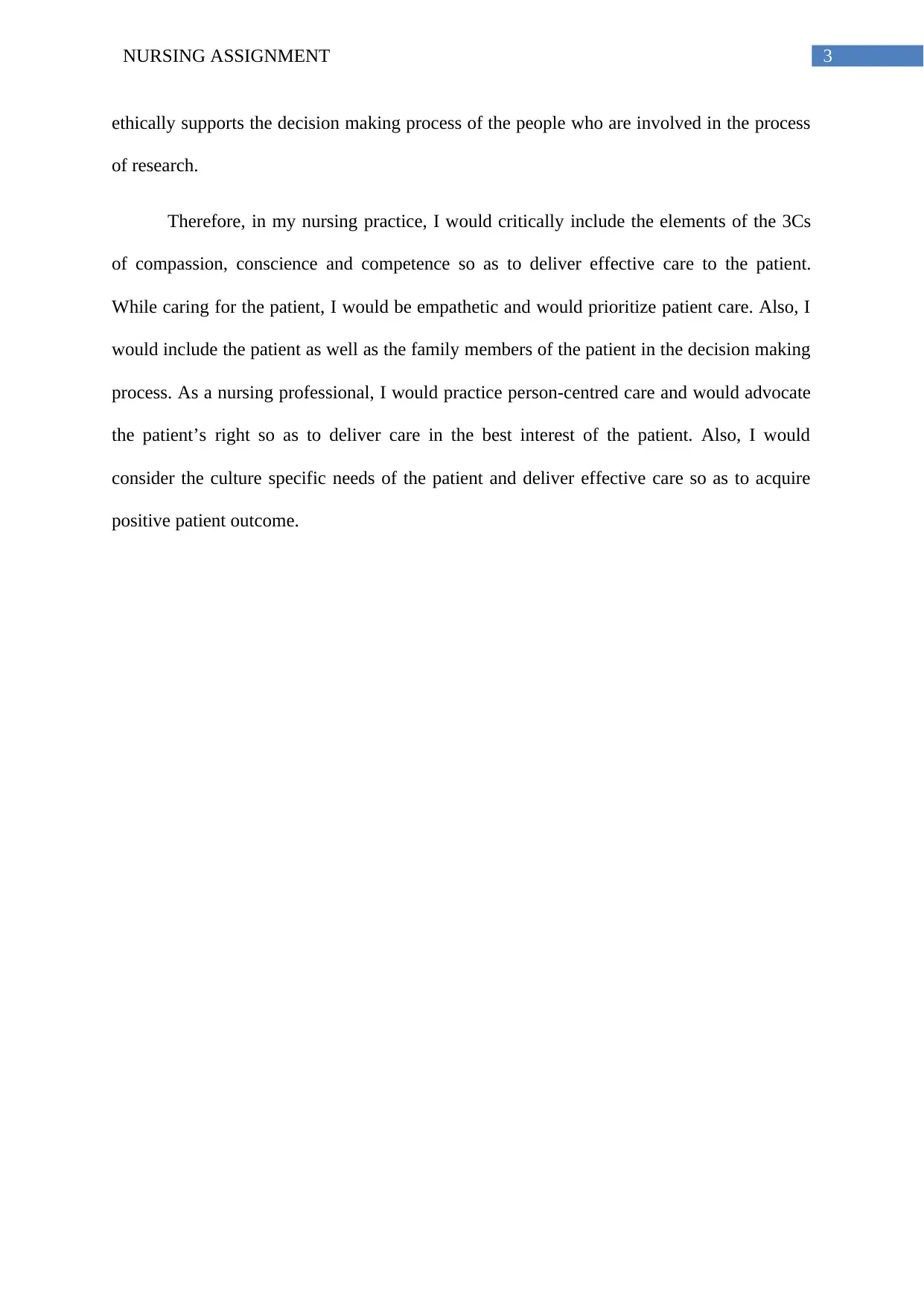
3NURSING ASSIGNMENT
ethically supports the decision making process of the people who are involved in the process
of research.
Therefore, in my nursing practice, I would critically include the elements of the 3Cs
of compassion, conscience and competence so as to deliver effective care to the patient.
While caring for the patient, I would be empathetic and would prioritize patient care. Also, I
would include the patient as well as the family members of the patient in the decision making
process. As a nursing professional, I would practice person-centred care and would advocate
the patient’s right so as to deliver care in the best interest of the patient. Also, I would
consider the culture specific needs of the patient and deliver effective care so as to acquire
positive patient outcome.
ethically supports the decision making process of the people who are involved in the process
of research.
Therefore, in my nursing practice, I would critically include the elements of the 3Cs
of compassion, conscience and competence so as to deliver effective care to the patient.
While caring for the patient, I would be empathetic and would prioritize patient care. Also, I
would include the patient as well as the family members of the patient in the decision making
process. As a nursing professional, I would practice person-centred care and would advocate
the patient’s right so as to deliver care in the best interest of the patient. Also, I would
consider the culture specific needs of the patient and deliver effective care so as to acquire
positive patient outcome.
Paraphrase This Document
Need a fresh take? Get an instant paraphrase of this document with our AI Paraphraser
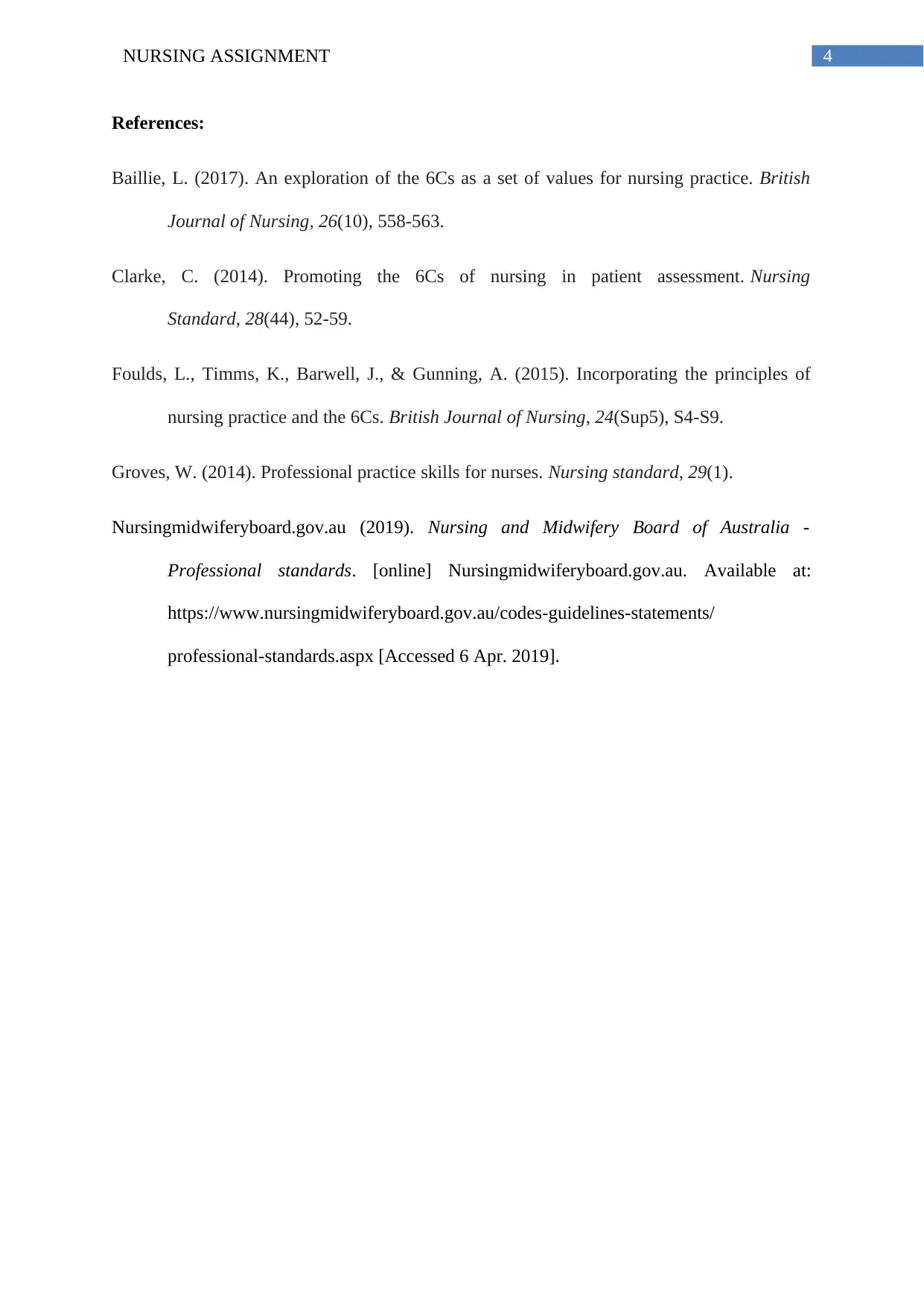
4NURSING ASSIGNMENT
References:
Baillie, L. (2017). An exploration of the 6Cs as a set of values for nursing practice. British
Journal of Nursing, 26(10), 558-563.
Clarke, C. (2014). Promoting the 6Cs of nursing in patient assessment. Nursing
Standard, 28(44), 52-59.
Foulds, L., Timms, K., Barwell, J., & Gunning, A. (2015). Incorporating the principles of
nursing practice and the 6Cs. British Journal of Nursing, 24(Sup5), S4-S9.
Groves, W. (2014). Professional practice skills for nurses. Nursing standard, 29(1).
Nursingmidwiferyboard.gov.au (2019). Nursing and Midwifery Board of Australia -
Professional standards. [online] Nursingmidwiferyboard.gov.au. Available at:
https://www.nursingmidwiferyboard.gov.au/codes-guidelines-statements/
professional-standards.aspx [Accessed 6 Apr. 2019].
References:
Baillie, L. (2017). An exploration of the 6Cs as a set of values for nursing practice. British
Journal of Nursing, 26(10), 558-563.
Clarke, C. (2014). Promoting the 6Cs of nursing in patient assessment. Nursing
Standard, 28(44), 52-59.
Foulds, L., Timms, K., Barwell, J., & Gunning, A. (2015). Incorporating the principles of
nursing practice and the 6Cs. British Journal of Nursing, 24(Sup5), S4-S9.
Groves, W. (2014). Professional practice skills for nurses. Nursing standard, 29(1).
Nursingmidwiferyboard.gov.au (2019). Nursing and Midwifery Board of Australia -
Professional standards. [online] Nursingmidwiferyboard.gov.au. Available at:
https://www.nursingmidwiferyboard.gov.au/codes-guidelines-statements/
professional-standards.aspx [Accessed 6 Apr. 2019].
1 out of 5
Related Documents
Your All-in-One AI-Powered Toolkit for Academic Success.
+13062052269
info@desklib.com
Available 24*7 on WhatsApp / Email
![[object Object]](/_next/static/media/star-bottom.7253800d.svg)
Unlock your academic potential
Copyright © 2020–2026 A2Z Services. All Rights Reserved. Developed and managed by ZUCOL.





